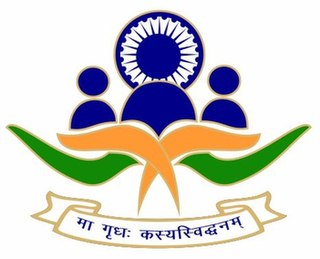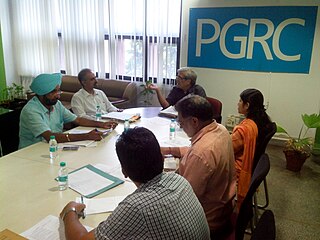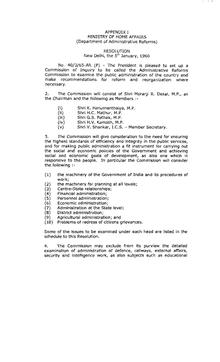
The district magistrate, also known as the district collector or deputy commissioner, is a career civil servant who serves as the executive head of a district's administration in India. The specific name depends on the state or union territory. Each of these posts has distinct responsibilities, and an officer can assume all of these roles at once. The district magistrate is primarily responsible for maintaining law and order, while the district collector focuses on revenue administration, and the deputy commissioner is in charge of overseeing developmental activities and coordinates government departments. Additionally, they also serve as election officers, registrar, marriage officer, licensing authority, and managing disaster responses, among other things. While the specific scope of duties may vary from state to state, they are generally similar. The district magistrate comes under the general supervision of divisional commissioner.
Mahatma Gandhi National Rural Employment Guarantee Act 2005 or MGNREGA, earlier known as the National Rural Employment Guarantee Act or NREGA, is an Indian social welfare measure that aims to guarantee the 'right to work'. This act was passed on 23 August 2005 and was implemented in February 2006 under the UPA government of Prime Minister Manmohan Singh following tabling of the bill in parliament by the Minister for Rural Development Raghuvansh Prasad Singh.

Marpadi Veerappa Moily is an Indian politician belonging to the Indian National Congress from the state of Karnataka.
The Ministry of Personnel, Public Grievances and Pensions is a ministry of the Government of India in personnel matters specially issues concerning recruitment, training, career development, staff welfare as well as the post-retirement dispensation.
Administrative Reform is a tool or process for improving administrative effectiveness and efficiency. Former Chief Minister V. S. Achuthanandan resigned from the post of chairman of the Kerala Administrative Reforms Commission on 30 January 2021.

A Lokpal is an anti-corruption authority or body of ombudsman who represents the public interest in the Republic of India. The current Chairperson of Lokpal is Ajay Manikrao Khanwilkar. The Lokpal has jurisdiction over central government to inquire into allegations of corruption against its public functionaries and for matters connected to corruption. The Lokpal and Lokayuktas Act was passed in 2013 with amendments in parliament, following the Jan Lokpal movement led by Anna Hazare in 2010. The Lokpal is responsible for enquiring into corruption charges at the national level while the Lokayukta performs the same function at the state level. The age of Lokpal on the date of assuming office as the chairperson or a member should not be less than 45 years.
The Lokayukta is the Indian Parliamentary Ombudsman, executed into power, through and for, each of the State Governments of India. It is brought into effect in a state after passing the Lokayukta Act in the respective state legislature, and a person of reputable background is nominated for the post. The post was created to quickly address the working of the government or its administration. Once appointed, Lokayukta cannot be dismissed or transferred by the government, and can only be removed by passing an impeachment motion by the state assembly.
The first Social Audit was carried out in Sweden (1985–88) by John Fry and Ulla Ressner, worklife researchers at the Centre for Swedish Working Life (Arbetslivscentrum) and published in Sweden in 1988 by Allmäna Förlaget, Stockholm under the title "Social Revision av ett Ämbetsverk". It was the result of a three-year study of Sweden's central bureaucracy - The National Labour Market Board (Arbetsförmedlingen). The study was based on interviews and questionnaires with over 1,000 employees at all levels of the organisation throughout the country and became the subject of debate in the Swedish Riksdag (Parliament). Its focus was to assess the correspondence between the work experiences of employees and management on the one hand, and the legislated and collectively agreed upon objectives for service, work environmental and managerial policies in its established definition of effectivity in the workplace. In short, it was an assessment of the institutionalisation of a Democratic Rationality.
The Law Commission of India is an executive body established by an order of the Government of India. The commission's function is to research and advise the government on legal reform, and is composed of legal experts, and headed by a retired judge. The commission is established for a fixed tenure and works as an advisory body to the Ministry of Law and Justice.

The National e-Governance Plan (NeGP) is an initiative of the Government of India to make all government services available to the citizens of India via electronic media. NeGP was formulated by the Department of Electronics and Information Technology (DeitY) and Department of Administrative Reforms and Public Grievances (DARPG). The Government approved the National e-Governance Plan, consisting of 27 "Mission Mode Projects" (MMPs) and 8 components, on 18 May 2006. This is an enabler of Digital India initiative, and UMANG in turn is an enabler of NeGP.
Central Secretariat Service is the administrative civil service under Group A and Group B of the Central Civil Services of the executive branch of the Government of India. They are governed by Central Secretariat Service Rules of 1962, which has been issued under the powers of Article 309 of the Constitution of India. The service members work under restrictions and rules of Central Civil Services (Conduct) Rules.

The Oklahoma Merit Protection Commission (OMPC) was an independent quasi-judicial agency of the government of Oklahoma established to protect the integrity of state’s merit system utilized by state agencies and their employees. The Commission and the Office of Personnel Management acted independently forming a “checks and balances” method of managing the merit system.
In India, the Civil Service is the collection of civil servants of the government who constitute the permanent executive branch of the country. This includes servants in the All India Services, the Central Civil Services, and various State Civil Services.

The Lokpal and Lokayuktas Act, 2013, commonly known as The Lokpal Act, is an anti-corruption Act of Indian Parliament in India which "seeks to provide for the establishment of the institution of Lokpal to inquire into allegations of corruption against certain important public functionaries including the Prime Minister, cabinet ministers, members of parliament, Group A officials of the Central Government and for matters connecting them".
The Tax Administration Reform Commission or TARC is committee appointed by the Government of India for giving recommendations for reviewing the public Tax Administration system of India. The Union Finance Minister had made an announcement in his Budget Speech 2013-14 for setting up of Tax Administration Reform Commission (TARC) to review the application of tax policies and tax laws in India in the context of global best practices, and to recommend measures for reforms required in tax administration. Accordingly, TARC was established vide the Government of India Notification dated 21 August 2013. The term of the Commission is 18 months and works as an advisory body to the Ministry of Finance. The Commission has given its first set of recommendations to the new government. Dr. Parthasarathi Shome is Adviser to the Indian Finance Minister, 2013. He was appointed Chairman of the Tax Administration Reforms Commission (TARC), Government of India

The Punjab Governance Reforms Commission (PGRC) was established on 8 January 2009 and again reconstituted in 2012 by the Government of Punjab, India, under the chairmanship of Parmod Kumar, a social scientist and director of the Institute for Development and Communication in Chandigarh. The commission's main objective is to improve the welfare of the disadvantaged, marginalized and deprived sections of Punjab and to suggest changes in the processes, procedures, rules, regulations and design of the public services. Another objective of the commission is to make a paradigm shift away from the colonial era of governance, when "citizens were not trusted by the government, and services were provided as doles or khirat and citizens were treated like Riaia and administration as Mai Baap".

The Ministry of State Secretariat is a government ministry responsible for providing technical, administrative, and analytical support to the President and Vice President in the exercise of their state powers. The current minister of state secretariat is Pratikno, who previously served as Rector of Gadjah Mada University in Yogyakarta.
Purna Chandra Hota was an Indian bureaucrat and civil servant. He was married to Bijoylaxmi Hota, a yoga expert and author of several books on yogic therapy. He had three children, Reema Hota Singh, an Indian revenue Service Officer, Prasenjeet Hota, and Reela Hota, an odissi dancer.
The Parliamentary Standing Committee on Finance (SCOF) is a department related standing committee (DRSC) constituted by the Parliament of India comprising selected members of parliament for the purpose of legislative oversight on the policies and decision making of the following four ministries:
- Ministry of Finance (MoF)
- Ministry of Corporate Affairs
- Ministry of Statistics and Programme Implementation
- NITI Aayog
The Personnel Secretary, popularly called as Secretary (P), is the administrative head of the Department of Personnel and Training (DoPT) under Ministry of Personnel, Public Grievances and Pensions. This post is held by senior IAS officer of the rank of Secretary to Government of India. The current Personnel Secretary is S. Radha Chauhan, a 1988 batch IAS officer of UP cadre.




















